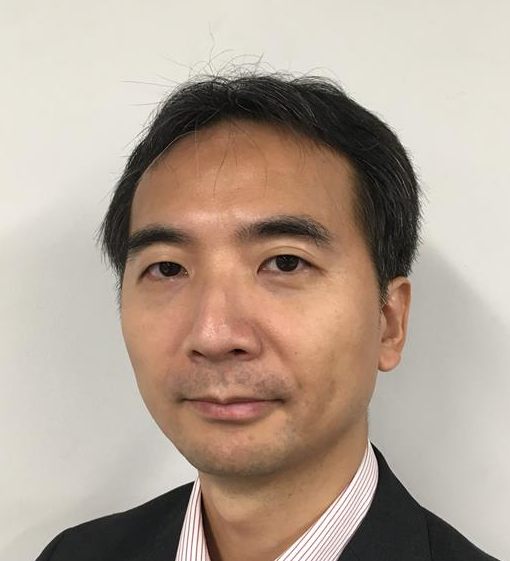 In below, I review the last year’s resolution 2017 and describe New Year’s Resolution 2018 in terms of Projects, Achievements, Community and Professional Contributions, and Team Organization. Japanese version is also available.
In below, I review the last year’s resolution 2017 and describe New Year’s Resolution 2018 in terms of Projects, Achievements, Community and Professional Contributions, and Team Organization. Japanese version is also available.
*Highlights*
2017: 13+ projects incl. SmartSE. 5+3 journal, 22+2 int’l conf papers. 1st time both presidential teaching & research awards. Honored to meet Majesty Emperor/Empress. AsianPLoP Local, ICST/CSEE&T PC Chairs, SamurAI Coding Director. New Secretary Takako.
2018: 7 funded projects, 7+ industrial ones. 7 journal, 20 int’l conf. papers. COMPSAC Local, APSEC PC, AsianPLoP General, IPSJ Convention Vice-PC Chairs, SamurAI Coding Director. Run for IPSJ Director. Secretary Naoko leaves. Lab’s 10th anniversary.
*Projects*
2017: We successfully continued the following 5 projects and launched a large education program called SmartSE in 2017. In addition, we continued 7+ industrial funded projects with industrial partners. We extended our international research connections incl. Fraunhofer IESE, Ecole Polytechnique de Montreal, Florida Atlantic University and Hillside Group.
- SmartSE: Smart Systems and Services innovative professional Education program 2017- (funded by MEXT Education Network for Practical Information Technologies: enPiT-Pro): Establishing advanced and practical education program and related research collaboration network involving 5000+ companies. Its kick-off joint symposium will be held on March 12 at Waseda University; its detail will be announced soon.
- G7 Programming Learning Summit 2016- (incorporation with FUJITELEVISION KIDS ENTERTAINMENT, INC., D2C Inc. and other collaborators): Comprehensive quantitative and qualitative study on programming learning environments for beginners and kids. We will hold a workshop on Jan 14 in Kashiwa City, and special session on Mar 13 at IPSJ National Convention.
- TraceANY 2016-2021 (funded by JSPS KAKENHI: Grants-in-Aid for Scientific Research (B)): Tracing any software artifacts at any abstraction levels based on common metamodels including Program Metamodel TAxonomy (ProMeTA).
- CSPM: Cloud Security and Privacy knowledge Metamodel 2015-2019 (funded by IISF SSR Forum, TAF and SCAT): Developing common metamodel for representing and organizing knowledge of security, privacy and transparency in cloud, fog and IoT computing.
- Waseda Software Quality Benchmark 2015- (funded by IPA/SEC RISE: Research Initiative on Advanced Software Engineering): SQuaRE-based comprehensive quality evaluation of software products
- GQM-RG: Goal-oriented Qualitative/Quantitative Measurement and Management Research Group 2013-: Applied and extension researches on GQM+Strategies and related approaches.
2018: We will make this year with significant advance by continuing and expanding all of the above-mentioned 6 projects in 2018. Also we will continue 7+ industrial funded projects with industrial partners. Moreover, we have a plan to initiate a related project in the area of IoT systems and software engineering.
*Achievements* (FY2017, FY2016)
2017: We published and presented 5 international journal papers indexed in SCIE, ESCI and DBLP, 22 international conference and workshop papers (incl. 2 at CORE Rank A conferences, 5 at Rank B, and 3 at Rank C), 4 international conference and workshop posters, 8 magazine articles and books, and 32 talks incl. two keynotes at international workshops. Moreover, our activities have been reported so frequently in many news medias including Yomiuri Shimbun, Tokyo Shimbun, Nikkan Kogyo Shimbun and BS FUJI TV. 3 international journal papers indexed in SCIE and DBLP, 2 international conference papers (incl. 1 at CORE Rank A) have been already accepted to be published in 2018. 2 journal papers have been conditionally accepted and to be revised in 2018. In addition, we received many awards incl. Waseda University Presidential Teaching Award and Research Award for me; it is for the first time in Waseda University history to receive both awards by the same professor. I was honored to meet our Majesty Japanese Emperor and Empress. On 1st Jan 2017, I stated that we hoped to publish 7 journal papers (incl. 3+ international) and 20 international conference and workshop papers (3+ at CORE Rank A/A* and 10+ at Rank B). By considering papers approved to be published in 2018, we almost successfully achieved the goal of number of papers stated. Of course, we believe we can do better and more in 2018.
2018: Having the similar but extended clear vision stating that “reliable systems and software engineering with special focus on actionable practices supported by theory and data”, we will push forward with research on novel and actionable software and systems engineering methods and tools based on well-defined and validated theory to contribute to software and systems engineering industry and academia in collaboration with 10+ local and global partners. We continue to acquire large funds. We aim to publish impactful papers at better places: at least 7 journal papers (incl. 4+ international) and 20 international conference papers (3+ at CORE Rank A/A* and 10+ at Rank B/C). Many of our research achievements in the form of methods, practices and tools shall be continuously used and produce actual values through our local and global partners.
*Community and Professional Contributions*
2017: Thanks to many collaborators and supporters, we contributed to several major programming and engineering contests: ET Robocon 2017 Tokyo Regional Contest, IPSJ SamurAI Coding 2016-17 and 2017-18. We organized and/or hosted many conferences and meetings including IEEE ICST 2017 as PC Co-Chair, IEEE CSEE&T 2017 as PC Co-Chair, AsianPLoP 2017 as Local Chair, XP-Matsuri 2017, PyCon JP 2017, Programming/IT Camps at Waseda with Life is Tech, and G7 PROGRAMMING LEARNING SUMMIT two times. Moreover, I played key roles in many societies including ISO/IEC/JTC1 SC7/WG20 Convenor, IEEE Computer Society Membership at Large for the Professional and Educational Activities Board (PEAB), IEEE Computer Society SWEBOK Steering Group Member, IEEE Computer Society Tokyo/Japan Joint Chapter Vice-Chair, SEMAT Japan Chapter Chair, Int. J. of Agile and Extreme Software Development (IJAESD) Editor-in-Chief, CSEE&T Steering Committee Member and JSSST Director.
2018: We continue to contribute to IPSJ SamurAI Coding 2017-18. Moreover, we will host and/or organize various conferences and meetings including AsianPLoP 2018 on Mar 1-2, IPSJ National Convention on Mar 13-15, IEEE COMPSAC 2018 on July 23-27, APSEC 2018 on Dec 4-7, and ET Robocon 2018 Tokyo Regional Contest on Aug-Oct. For these events, I will play key roles such as Vice PC Chair of IPSJ Convention, General Chair of AsianPLoP 2018, Local Chair of COMPSAC 2018 and PC Co-Chair of APSEC 2018 to contribute to the outer world and expand our network. I continue to serve as ISO/IEC/JTC1 SC7/WG20 Convenor, IEEE Computer Society Tokyo/Japan Chapter Vice Chair, IEEE CS PEAB Member, IEEE CS SWEBOK Steering Group Member, IEEE CS Tokyo/Japan Joint Chapter Vice-Chair, SEMAT Japan Chapter Chair, IJAESD Editor-in-Chief, CSEE&T Steering Committee Member and JSSST Director. In addition, I will run for IPSJ Director 2018-2019 nominated by IPSJ Board of Directors.
*Team Organization*
2017: We had several new international students from India and France in 2017. In addition, new Secretary Ms. Takako Ogawa joined our team.
2018: Like last year, we expect some new students coming from various countries. Our team is growing and having more diversity in national origins, backgrounds and mindsets. Such diversity contributes to our team in various aspects such as creativity to advance the above-mentioned projects and professional contributions. Secretary Ms. Naoko Shinohara will leave our lab. We will celebrate 10th anniversary of our lab.
Hironori Washizaki
Professor, Director of Global Software Engineering Laboratory, Waseda University
Visiting Professor, National Institute of Informatics
Outside Director, SYSTEM INFORMATION CO.,LTD.


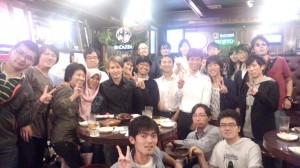
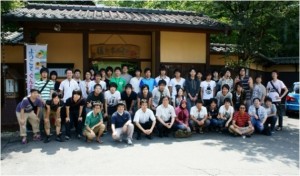
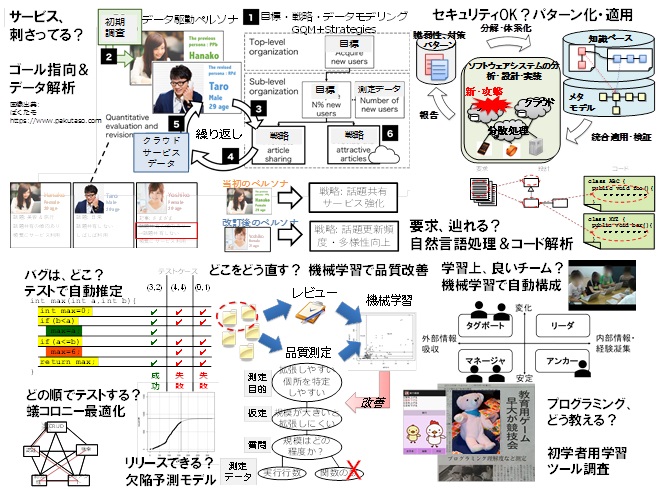
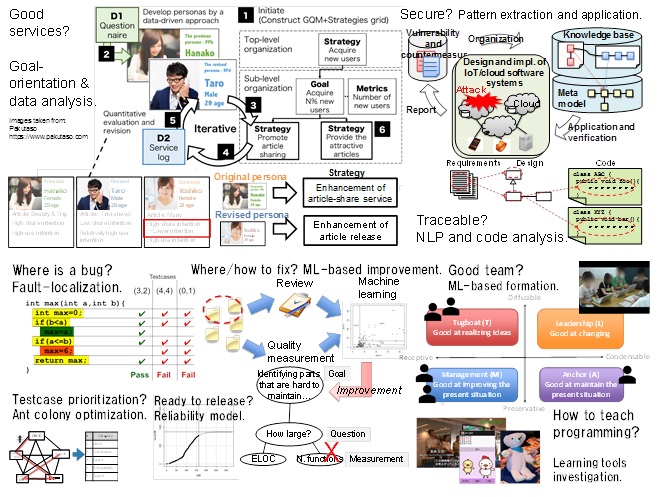
 In below, I review the last year’s resolution 2017 and describe New Year’s Resolution 2018 in terms of Projects, Achievements, Community and Professional Contributions, and Team Organization.
In below, I review the last year’s resolution 2017 and describe New Year’s Resolution 2018 in terms of Projects, Achievements, Community and Professional Contributions, and Team Organization.